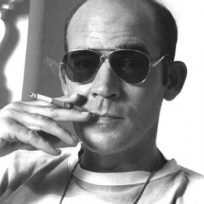Hunter S. Thompson
Hunter Stockton Thompson (July 18, 1937 – February 20, 2005) was an American journalist and author. He was known for his flamboyant writing style, most notably in his novel Fear and Loathing in Las Vegas, which blurred the distinctions between writer and subject, fiction and nonfiction. He was the creator of Gonzo journalism and, as such, is widely imitated
A Louisville, Kentucky native, Thompson grew up in the Cherokee Triangle neighborhood of the Highlands. His father’s death lead Hunter and his two brothers to be brought up by their mother, who was a heavy drinker. Thompson’s difficult youth, and its influence on his behavior and the development of his misanthropic worldview, await serious literary analysis.
After early trouble with the law, including an arrest in 1956 for robbery, he enlisted in the U.S. Air Force. His decision to join the Air Force was influenced by the waiting period required before joining the army, which he attempted to join following the crash (at his hands) of an employer’s delivery truck.
At Elgin Air Force Base, Florida, in 1956, he began working as a sports journalist, writing for the base newspaper and moonlighting for various local newspapers on the side, despite regulations. He was discharged in 1958 and claimed to have been issued a “totally unclassifiable” status. After the Air Force he moved to New York City and on the GI Bill attended Columbia University’s School of General Studies where he took classes on short story writing.
Published in 1971, Fear and Loathing in Las Vegas: A Savage Journey to the Heart of the American Dream is a first-person account by a journalist (Thompson himself, under the pseudonym “Raoul Duke”) on a trip to Las Vegas with his “300-pound Samoan” attorney, “Dr. Gonzo” (a character inspired by Thompson’s lawyer friend) to cover a narcotics officers’ convention and the “fabulous Mint 400” motorcycle race. During the trip, he and his lawyer become sidetracked by a search for the American dream, with the aid of copious amounts of alcohol, LSD, ether, adrenochrome, mescaline, cocaine, marijuana and other drugs.
While distinctly embracing the notion of democracy and its virtues as evidenced in his political writings in both the 1972 and 1976 elections, Thompson was acutely aware of the flaws in such a system and regularly advocated radical approaches to politics that veered between libertarian, anarchist, and elements of socialism. In the documentary “Breakfast With Hunter”, Thompson can be seen in several scenes wearing different Che Guevara tee-shirts, while his son Juan Thompson acknowledges that his father had “a perverse resistance to security and predictability, and a deliberate disregard for propriety.” Thompson’s official biographer and longtime friend Douglas Brinkley said: “He’s both a kind of old-fashioned believer in democratic virtues, but also an anarchist. There’s always that unpredictable element with him. In any given situation, as soon as he feels there’s a system closing in, he’ll destroy it.”
Thompson debuted in Rolling Stone with an article describing his 1970 bid for sheriff of Pitkin County, Colorado on the “Freak Power” ticket. Thompson narrowly lost the election, having run on a platform promoting drugs decriminalization for use only, tearing up the streets and turning them into grassy pedestrian malls, banning any building so tall as to obscure the view of the mountains, and renaming Aspen, Colorado to “Fat City”. The incumbent Republican sheriff whom he ran against had a crew cut, prompting Thompson to shave his head bald and refer to his opposition as “my long-haired opponent.” The godfather of Gonzo glorified grass like no other: “I have always loved marijuana. It has been a source of joy and comfort to me for many years. And I still think of it a s a basic staple of life, along with beer and ice and grapefruits-and millions of Americans agree with me.”
